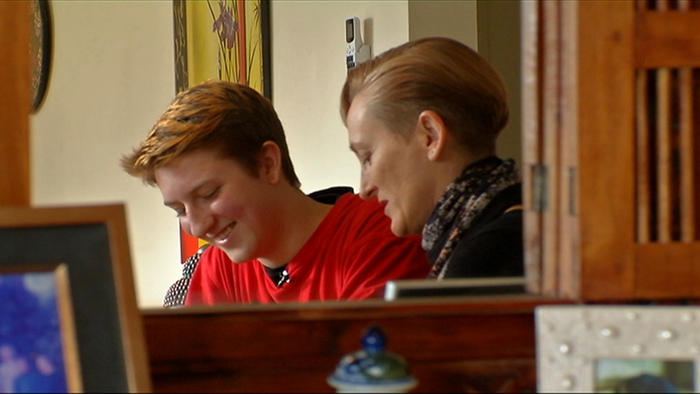
Kathmandu (Pahichan) June 5 – Elliot Taylor was born a female, but his birth name is one he no longer wants uttered. Life-changing drugs are now part of the 17-year-old’s daily routine.
“As time progress, my features are going to progress. With hormones I’m going to get some facial hair and my voice will deepen and stuff, so it’s very exciting that it’s going to continue to achieve what I want it to achieve,” he said.
He’ll also stop menstruating, breast development will cease and fat will be redistributed on his body.
He began questioning his gender identity at the start of high school.
But it took a few more years before he announced he wanted to change his gender.
His mother, Robin Ritchie said it was a very difficult time.
“Elliot had probably pretty much reached breaking point in holding everything in, so we had some issues at home, I guess. He finally broke one day and told us, which was a big relief in a way,” she said.

Elliot Taylor with his mother, Robin Ritchie.
Presenting as male at school, Elliot battled bullies and resorted to self harm.
He underwent a year of medical assessments to test his physical and psychological health.
But, like all transgender children in Australia, he needed the approval of the Family Court to receive irreversible hormone treatment, known as stage two, to change his gender.
“At the start, when I found out I still had to go through court for it it was a slap in the face again,” Elliot said.
“That shock of I might not be able to go on hormones before I turn 18, and that was really scary and upsetting.”
Responding to a largely unmet legal need, not-for-profit organisation Justice Connect launched a service earlier this year dedicated to helping trans children.

Elliot Taylor’s baby photos.
Edward Davis, a lawyer with Justice Connect, said it’s their intention that every person who calls is provided access to free legal representation.
“A lot of other organisations might have a wait list, or have to defer some people based on where they are calling, but no matter where people are calling from in Australia, and what their personal circumstances are, including financial means, we’ll refer them to free legal representation,” he said.
Justice Connect said so far this year it’s connected 21 children with lawyers to represent them free of charge, saving each client on average up to $10,000.
Elliot believes changing his gender is a medical, not a legal issue, and trans children like him shouldn’t have to go to court.
And there are growing calls to remove the courts from the process.
“On social media and things like that, you know, petitions to get the court out of the process, and judges themselves even saying that they feel the courts shouldn’t be involved in the process, simply because of the fact that they aren’t medical professionals, they don’t know what all these drugs do for people and they haven’t obviously been treating that person,” Elliot said.

Like all transgender children in Australia, Elliot Taylor needed the approval of the Family Court to receive irreversible hormone treatment.
A call echoed by mental health experts.
Karen Field is the Chief Executive of Queer Space, a mental health and wellbeing service.
“Not only does it have a huge impost and very unnecessary impost on that child or young person, but also in terms of the family,” she said.
“There’s the human cost in terms of the added stress, anxiety and strain, and almost traumatic experience of going through that court system. In addition to that, the huge financial costs.”
And when it comes to Elliot’s mum’s thoughts about her son’s decision, she said she could not be prouder.
“Proud that he’s had the conviction to continue and push for what he wants,” she said.
“He’s blossomed I guess over the last 12 months. A lot more positive, a lot more outgoing. Doing what normal teenagers do.”
Elliot is now focused on continuing his hormone treatment and finishing high school.
Copy : http://www.sbs.com.au
Copyright © All right reserved to pahichan.com Site By: Sobij.